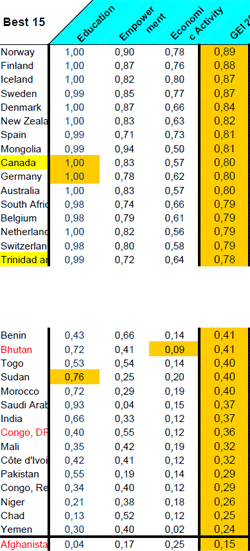Thailand’s gender equality is superior to its neighbours’, says watchdog organization
|
Published on Thu, 2012-03-15 11:09
In terms of gender equity Thailand is slightly above the East Asia & the Pacific average, and all of its neighbours are in worse condition. This is made apparent by the publication of the Gender Equity Index (GEI) 2012, published by Social Watch on the eve of Women’s International Day, March 8. The index prepared annually by Social Watch measures the gap between women and men in education, the economy and political empowerment. The index is an average of the inequalities in the three dimensions. In literacy, it examines the gender gap in enrolment at all levels; economic participation computes the gaps in income and employment; empowerment measures the gaps in highly qualified jobs, parliament and senior executive positions. Social Watch measures the gap between women and men, not their wellbeing. Thus, a country in which young men and women have equal access to the university receives a value of 100 on this particular indicator. In the same fashion, a country in which boys and girls are equally barred from completing primary education would also be awarded a value of 100. This does not mean that the quality of education in both cases is the same. It just establishes that, in both cases girls are not less educated than boys.
Thailand’s 71 points rank it among those countries with LOW GEI, two points above the East Asia & Pacific’s average, which stands at 69. All of its neighbours are in worse condition: Vietnam (70), Indonesia (62), Lao PDR, Malaysia (both with 56 points), Cambodia (55), and India (37). The region is led by New Zealand (82), Mongolia (81) and Australia (80). The countries at the bottom are Lao PDR, Malaysia (both with 56 points) and Cambodia (55). The Usa Lerdsrisuntad Foundation for Women has declared that “the GEI really reflects the situation of Thai women, since many are at risk of being trafficked or exploited from migration, suffer from gender based violence and are vulnerable to HIV infection and unwanted pregnancy”. This is the result, adds the foundation “of little intervention from the Government in the economic and social empowerment of women.” The Women’s Network for the Advancement and Peace states that the government should create a Fund for Women to cope with the situation reflected in the country’s GEI and generates an adequate strategy for distributing the fund thus benefiting the most disadvantaged groups.
The five levels according to which the index measures the gender gap are: CRITICAL, VERY LOW, LOW, MEDIUM AND ACCEPTABLE, It should be noted that no country has reached 90 points or more, meaning that no country has yet reached the ACCEPTABLE level. The only dimension in which Thailand reaches an ACCEPTABLE value is education (97 points), while in empowerment and economic participation the country’s performance is much less praiseworthy: 39 and 57 respectively (VERY LOW and LOW). At a world level, the countries that have achieved the better scores are Norway (89), Finland (88), and Iceland (87), which place them as countries with a MEDIUM GEI. Out of the 154 countries computed by the 2012 GEI those five in the worst global situation are Congo Rep (29), Niger (26), Tchad (25), Yemen (24) and Afghanistan (15). Social Watch members are spread across all regions. The network fights for the eradication of poverty and its causes, the elimination of all forms of discrimination and racism and to ensure an equitable distribution of wealth and the realization of human rights. For a detailed description of methodology and sources see http://www.socialwatch.org/node/14365 Tags: |


